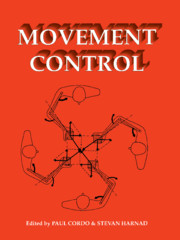Book contents
- Frontmatter
- Contents
- Preface
- 1 Does the nervous system use equilibrium-point control to guide single and multiple joint movements?
- 2 Does the nervous system depend on kinesthetic information to control natural limb movements?
- 3 Can sense be made of spinal interneuron circuits?
- 4 Implications of neural networks for how we think about brain function
- 5 Do cortical and basal ganglionic motor areas use “motor programs” to control movement?
- 6 Functional heterogeneity with structural homogeneity: How does the cerebellum operate?
- 7 Are movement parameters recognizably coded in the activity of single neurons?
- 8 The representation of egocentric space in the posterior parietal cortex
- Open Peer Commentary and Authors' Responses
- References
- Index
8 - The representation of egocentric space in the posterior parietal cortex
Published online by Cambridge University Press: 11 December 2009
- Frontmatter
- Contents
- Preface
- 1 Does the nervous system use equilibrium-point control to guide single and multiple joint movements?
- 2 Does the nervous system depend on kinesthetic information to control natural limb movements?
- 3 Can sense be made of spinal interneuron circuits?
- 4 Implications of neural networks for how we think about brain function
- 5 Do cortical and basal ganglionic motor areas use “motor programs” to control movement?
- 6 Functional heterogeneity with structural homogeneity: How does the cerebellum operate?
- 7 Are movement parameters recognizably coded in the activity of single neurons?
- 8 The representation of egocentric space in the posterior parietal cortex
- Open Peer Commentary and Authors' Responses
- References
- Index
Summary
Abstract: The posterior parietal cortex (PPC) is the most likely site where egocentric spatial relationships are represented in the brain. PPC cells receive visual, auditory, somaesthetic, and vestibular sensory inputs; oculomotor, head, limb, and body motor signals; and strong motivational projections from the limbic system. Their discharge increases not only when an animal moves towards a sensory target, but also when it directs its attention to it. PPC lesions have the opposite effect: sensory inattention and neglect. The PPC does not seem to contain a “map” of the location of objects in space but a distributed neural network for transforming one set of sensory vectors into other sensory reference frames or into various motor coordinate systems. Which set of transformation rules is used probably depends on attention, which selectively enhances the synapses needed for making a particular sensory comparison or aiming a particular movement.
Information
- Type
- Chapter
- Information
- Movement Control , pp. 89 - 98Publisher: Cambridge University PressPrint publication year: 1994
Accessibility standard: Unknown
Why this information is here
This section outlines the accessibility features of this content - including support for screen readers, full keyboard navigation and high-contrast display options. This may not be relevant for you.Accessibility Information
- 1
- Cited by
